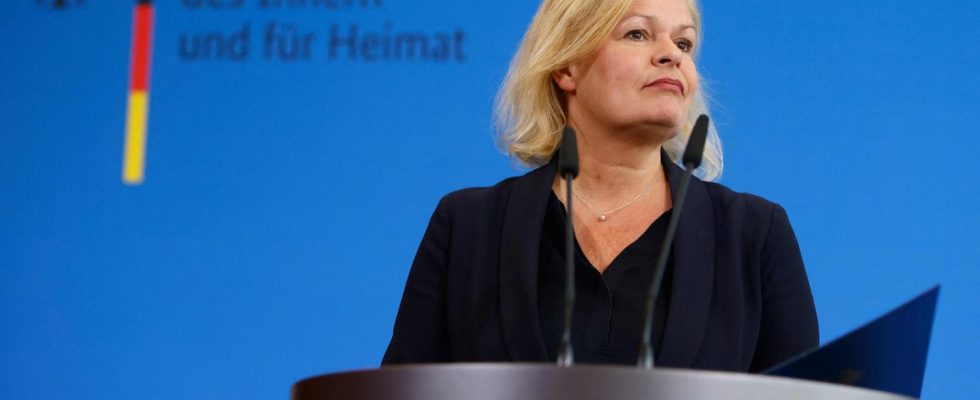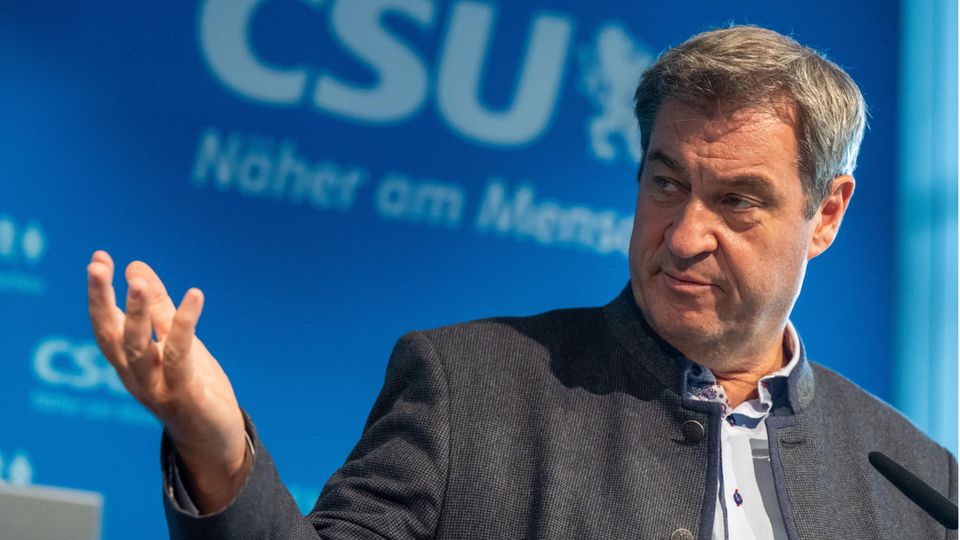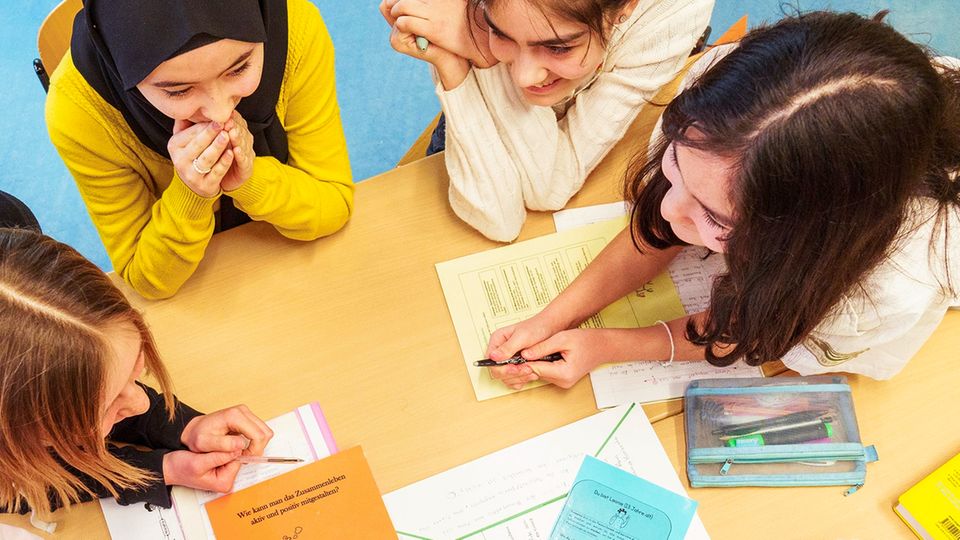analysis
Cabinet decision
It is questionable whether the traffic light plans for more deportations will meet expectations
Federal Minister of the Interior Nancy Faeser (SPD)
© MICHELE TANTUSSI / AFP
The federal government wants to deport more and faster. However, it is far from clear whether stricter deportation rules will actually lead to significantly more deportations.
“We are starting a repatriation offensive,” it says in the coalition agreement of the traffic light parties. Now the starting signal has been fired: The Federal Cabinet has passed the “Repatriation Improvement Act,” which coalition members hope will result in more and faster deportations of rejected asylum seekers.
The “bundle of restrictive measures” is necessary to “significantly limit” irregular migration to Germany, said Federal Interior Minister Nancy Faeser (SPD) in Berlin. Faster and more deportations of rejected asylum seekers also served to create “enough capacity” for people who actually needed protection in Germany.
Legal changes are planned, which the federal and state governments had already agreed on at their migration summit in May, but also further measures to “easier identity verification”, “deportations of criminals and dangerous people” and the “removal of obstacles to enforcement”, as stated in the document The bill introduced by Interior Minister Faeser is called. This is due to that star before.
There is enormous pressure on the federal government to quickly reduce the number of illegal migrants. “Too many are coming,” said Chancellor Olaf Scholz (SPD) in an unusually cool tone in the “Spiegel” interview. “We finally have to deport on a large scale those who have no right to stay in Germany.”
However, it is questionable whether the plans presented, which are now being discussed in the Bundestag, can meet the high expectations.
Tougher rules – but also more deportations?
Basically, the “Return Improvement Act” is intended to relieve the responsible authorities and make deportations easier – at best, accelerate them. A number of measures are planned:
- For example, the maximum duration of detention on departure should be extended from the current ten to up to 28 days in order to gain more time when preparing deportations.
- In order to be able to clarify the identity of deportation candidates without any doubt, searches of apartments for data storage devices and documents should also be permitted in the future, as many asylum seekers do not have valid identity documents.
- In addition, police officers should be allowed to enter other rooms in shared apartments. This is intended to prevent those required to leave the country from disappearing.
- The obligation to announce deportations should also be abolished. Families with children under twelve years of age are exempt.
- The expulsion of smugglers should be particularly promoted. In the future, there will be “a particularly serious interest in deportation” if the person in question is sentenced to a prison sentence of at least one year.
It is far from clear whether such stricter deportation rules will actually lead to significantly more deportations.
Only a fraction of the asylum seekers who are required to leave Germany are potentially at risk of deportation. As of the reporting date of August 31, 2023 according to information from the Federal Ministry of the Interior in the Central Register of Foreigners (AZR) 261,925 people who are required to leave the country are registered, of which 210,528 are on toleration status and only 51,397 are not on toleration. Those seeking protection with a tolerated status are obliged to leave the country, but cannot be deported for certain reasons. These include an unclear identity, illnesses or your own children who have a residence permit.
According to the law, deportation is also prohibited if people are “threatened by a significant, concrete danger to life, limb or freedom in the destination country” (Section 60 Paragraph 7 Residence Act), i.e. if they come from countries where, for example, there is war. According to the AZR figures, a significant proportion of those required to leave the country come from these same countries, such as Afghanistan, Iraq or Syria.
However, there is often a lack of willingness on the part of the target countries to cooperate in accepting the deportees back. In other words: deportations are not possible without countries of origin that are willing to accept them. The federal government has therefore been trying to find migration agreements for a long time. In return for the return of rejected asylum seekers, citizens of the countries concerned should be given the opportunity to enter legally – so that all sides benefit, according to the idea. However, deputy government spokeswoman Christiane Hoffmann admitted on Monday that the negotiations were “not easy processes” and would take time.
The proposals from Interior Minister Faeser and the traffic light coalition are aimed primarily at a more consistent implementation of deportations on the German side. According to information from the federal government to the left-wing faction, there were a total of 7,861 deportations between January and June of this year; in the same period last year there were 6,198 deportations. And in the future? The draft law states: “It is difficult to estimate how many additional deportations will be carried out due to the legal changes.” The Interior Ministry is apparently hoping for the best.
However, people don’t seem to have too high hopes. It is assumed, it says in the explanatory notes to the draft law, that by tightening the obligation to leave the country, “the number of deportations will increase by 600 (5 percent).
Critics also consider the effect of the measures to be manageable, for various reasons. The domestic policy spokesman for the Union parliamentary group Alexander Throm (CDU) welcomed the removal of hurdles for deportations. But he noted: “What is crucial is to slow down the unbridled influx of asylum migration.” Unauthorized entries into Germany and Europe must be reduced. Wiebke Judith from Pro Asyl criticized the federal government for sacrificing the rights of those affected to the “right-wing populist discourse”. Tightening the deportation rules would “hardly lead to significantly more people being deported.”
Criticism also came from the ranks of the traffic light coalition. The Green MP Jamila Schäfer told “t-online”: “We must not act as if the solution to the issue of migration policy lies primarily in deportations, because most people cannot be deported because they come from war zones like Ukraine , Syria or Afghanistan.”





